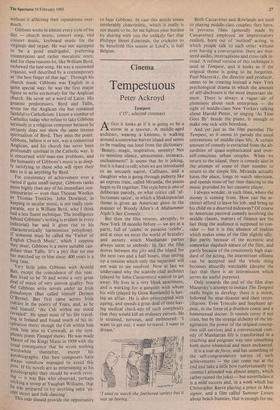Cinema
Tempestuous
Peter Ackroyd
Tempest ('15', selected cinemas)
Afirst it looks as if it is going to be a storm in a tea-cup. A middle-aged architect, wearing a kimono, is walking around a somewhat barren island and seems to be reading out loud from the dictionary: `Beauty, magic, inspiration, serenity! Not to mention silence, amazement, intimacy, enchantment!' It seems that he is joking, but it is hard to tell; when we are introduced to an uncouth native, Calibano, and a daughter who is going through puberty like an express train, called Miranda, the pieces begin to fit together. The style here is one of deliberate parody, or what critics call 'af- fectionate satire', in which a Shakespearian theme is given an American gloss in the manner of Woody Allen's A Midsummer Night's Sex Comedy.
But then the film returns, abruptly, to New York 18 months before — we are at a party, full of 'celebs' or putative `celebs', and at once we enter the world of brutality and anxiety which Manhattan parties always seem to embody. In fact the film moves between the city and the island for the next two and a half hours, thus setting up a tension which only the impatient will not wait to see resolved. Now at last we understand why the scantily clad architect (played by John Cassavettes) wanted to get away. He lives in a very bleak apartment, and is working for a gangster with whom his wife (played by Gena Rowlands) is hav- ing an affair. He is also preoccupied with ageing, and spends a great deal of time hav- ing medical check-ups of such complexity that they would kill an ordinary person. He is strained, nervous, and embittered: 'I want to get out. 1 want to travel. I want to dream.'
'I used to watch the feathered variety but it was so boring.' Both Cassavettes and Rowlands are used to playing middle-class couples; they have, in previous films (generally made by Cassavettes) employed an improvisatory realism, born out of 'method' acting, in which people talk to each other without ever having a conversation: there are mut- tered asides, interruptions and cross-talk in- stead. A refined version of this technique is used in Tempest, and it looks as if the original theme is going to be forgotten. Paul Mazursky, the director and producer, seems to be creating instead a New York psychological drama in which the amount of self-disclosure is the most important ele- ment. There is always a vague air of phoniness about such enterprises — the sight of middle-class New Yorkers talking about Harold Pinter, or singing 'As Time Goes By' beside the piano, is enough to make one sick with boredom.
And yet just as the film parodies The Tempest, so it seems to parody the usual conventions of middle-class life. A certain amount of comedy is extracted from the ab- surdities of quasi-sophisticated and over- self-conscious urban couples. When we return to the island, there is comedy also in the attempt of some of their number to return to the simple life. Miranda actually hates the place, longs to watch television, and spends most of her time dancing to the music provided by her cassette player.
I always wonder, in such films, where the money is coming from. How can the ar- chitect afford to leave his job, and bring up his child on a deserted hideaway? Of course in American pastoral comedy involving the middle classes, matters of finance are the last thing the audience is supposed to con- sider — but it is this absence of realism which makes some of the film slightly silly. But partly because of the eccentric and somewhat slapdash nature of the film, and partly because of the consistently high stan- dard of the acting, the intermittent silliness can be accepted and the whole thing becomes absurdly watchable (despite the fact that there is an intermission which serves no useful purpose).
Only towards the end of the film does Mazursky's attempt to imitate The Tempest really begin to develop: there is a storm, followed by near-disaster and then recon- ciliation. Even Trinculo and Stephano ap- pear, in the form of a drunken comic and a homosexual doctor. It sounds corny if not crass, but by the strange alchemy of the im- agination the power of the original concep- tion still survives and a conventional com- edy of Manhattan life is transformed in a touching and poignant way into something both more whimsical and more enchanted.
It is a tour de force, and has something of the self-congratulatory nature of such achievements — the cast come out at the end and take a little bow (unfortunately the cinema I attended was almost empty, which rather ruined the joke) — but nevertheless it is a mild success and, in a week which has Christopher Reeve playing a priest in Mon- signor, and a film called Summer Lovers about beach bunnies, that is enough for me.






































 Previous page
Previous page